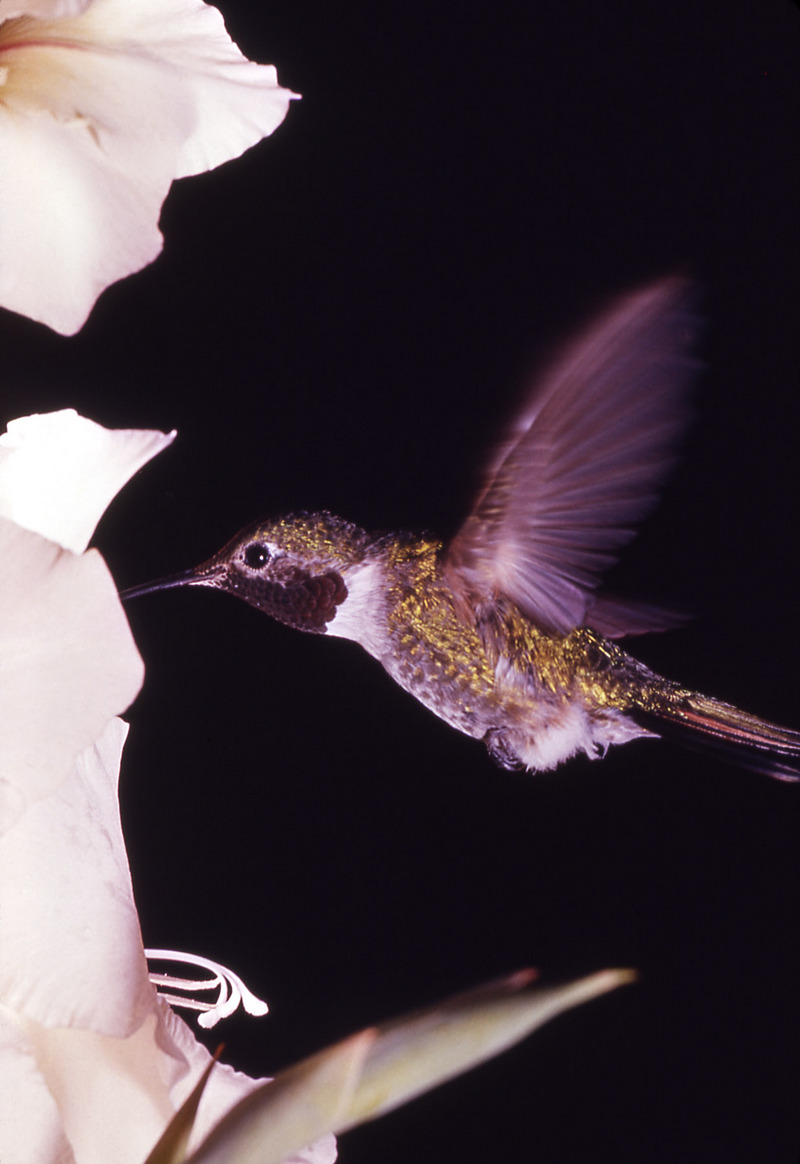|
| Query: selasphorus platycercus | Result: 8th of 36 | |
Broad-tailed Hummingbird (Selasphorus platycercus) - Wiki
| Subject: | Broad-tailed Hummingbird (Selasphorus platycercus) - Wiki
| |

| Resolution: 1236x1798
File Size: 189537 Bytes
Upload Date: 2007:09:28 22:56:09
|
Broad-tailed Hummingbird
From Wikipedia, the free encyclopedia
[Photo] Broad-tailed Hummingbird (Selasphorus platycercus). Creator: Bill Ratcliff. URL: NPS (http://www.nps.gov/yell/slidefile/birds/miscellaneous/page-1.htm). License: public domain
The Broad-tailed hummingbird, Selasphorus platycercus, is a medium-sized hummingbird, nearly four inches (10 cm) in length.
Male and female both have iridescent green backs and crowns and a white breast. The male has a gorget (throat patch) that shines with a brilliant red iridescence. The female is much duller with rust-colored, mottled flanks and underside. Female's tail feathers are tipped with a band of white. In flight the wings produce a distinct trilling noise diagnostic for this species.
The summer range of the Broad-tailed Hummingbird extends across mountain forests and meadows throughout the Western United States and central Mexico as far south as Guatemala. At summer's end the northernly migrate and overwinter in the southern part of their range. This species is somewhat vagrant, especially wintering birds, and is regularly seen in El Salvador where it does not breed. They occur at altitudes of 700-900 m up to 3.350 m ASL in the tropical parts of their range.
Aside from the typical hummingbird diet of nectar and insects found at flower blossoms, the broad-tailed hummingbird will also feed on foliage and actively hunt insects in flight. This species is not considered endangered; it appears to be able to adapt quite well to human-modified habitat and frequents shade coffee plantations.
Nests are small cup of plant fibers woven together and bound to a branch with collected spider webs. The female lays two plain white eggs, that she alone will incubate for 16 days. Young broad-tailed hummingbirds fledge about 23 days after hatching.
This species is known to hybridize with Costa's Hummingbird, but apparently only very rarely.
http://en.wikipedia.org/wiki/Broad-tailed_Hummingbird
| The text in this page is based on the copyrighted Wikipedia article shown in above URL. It is used under the GNU Free Documentation License. You may redistribute it, verbatim or modified, providing that you comply with the terms of the GFDL. |
|
Comments |
|---|
| | Guest |
|
Scientific Name: Selasphorus platycercus (Swainson, 1827)
Synonyms: Selasphorus platycercus platycercus (Swainson, 1827)
Common Names: Broad-tailed Hummingbird
French: Colibri à queue large German: Breitschwanzelfe Spanish: Colibrí coliancho, Zumbador cola ancha
Taxonomy: Trochilus platycercus Swainson, 1827, no locality = Mexico. |
 |

|

|
selasphorus platycercus
8/36 |

|

|
^o^
Animal Pictures Archive for smart phones
^o^
|
|
|